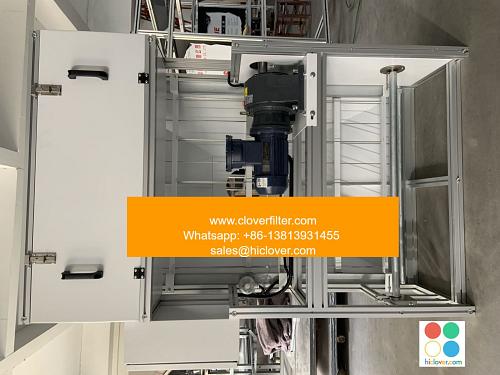Sterile Production in Sherbrooke: The Benefits of Automatic Roll Air Filters in Reducing Cross-Contamination

The city of Sherbrooke, known for its vibrant industrial sector, has become a hub for sterile production, with numerous companies operating in the pharmaceutical, medical device, and food processing industries. In these environments, maintaining sterility is crucial to prevent cross-contamination and ensure the quality of products. One effective solution for achieving this goal is the implementation of automatic roll air filters. In this article, we will delve into the benefits of using these filters in sterile production facilities in Sherbrooke, highlighting their application areas and the advantages they offer in reducing cross-contamination.
Understanding the Importance of Sterile Production
Sterile production involves the manufacture of products in a controlled environment, where the absence of microorganisms is crucial. This is particularly significant in the pharmaceutical and medical device industries, where the presence of contaminants can have serious consequences for patient health. Similarly, in food processing, sterile production helps prevent the growth of bacteria, yeast, and mold, extending the shelf life of products and ensuring consumer safety. The use of automatic roll air filters is a key component in maintaining the sterility of these environments.
The Role of Automatic Roll Air Filters in Sterile Production
Automatic roll air filters are designed to provide continuous, uninterrupted filtration, capturing particles and microorganisms from the air. These filters are particularly beneficial in sterile production facilities, as they minimize the risk of cross-contamination. By automatically rolling out a new filter media as the old one becomes saturated, these systems ensure that the air quality remains consistent, reducing the potential for microbial growth. This is especially important in applications such as cleanroom technology, laminar flow, and HEPA filtration systems, where the highest levels of air purity are required.
Application Areas of Automatic Roll Air Filters
The benefits of automatic roll air filters can be seen across various industries involved in sterile production in Sherbrooke. Some of the key application areas include:
* Pharmaceutical manufacturing: In the production of drugs and vaccines, maintaining a sterile environment is paramount. Automatic roll air filters help in achieving this by minimizing airborne contaminants.
* Medical device manufacturing: For companies producing medical implants, surgical instruments, and diagnostic equipment, preventing cross-contamination is critical. These filters play a vital role in ensuring the sterility of manufacturing areas.
* Food processing: In facilities where food products are packaged or processed, automatic roll air filters help control microbial contamination, ensuring product safety and quality.
Benefits of Reducing Cross-Contamination with Automatic Roll Air Filters
The implementation of automatic roll air filters in sterile production facilities offers several benefits, including:
* Enhanced product quality: By reducing airborne contaminants, these filters help in producing high-quality products that meet stringent regulatory and consumer standards.
* Increased efficiency: Automated filtration systems minimize downtime associated with filter maintenance, allowing for continuous production.
* Regulatory compliance: Facilities equipped with automatic roll air filters are better positioned to meet and exceed regulatory requirements for sterility and air quality.
* Cost savings: Reducing cross-contamination leads to lower rates of product rejection and recall, resulting in significant cost savings for manufacturers.
Conclusion
In the context of sterile production in Sherbrooke, automatic roll air filters emerge as a crucial technology for reducing cross-contamination. Their application across pharmaceutical, medical device, and food processing industries highlights their versatility and importance. By understanding the benefits and application areas of these filters, companies can take significant strides in enhancing product quality, ensuring regulatory compliance, and maintaining the integrity of their sterile production environments. As the industrial sector in Sherbrooke continues to evolve, the role of automatic roll air filters in sterile production will remain pivotal, contributing to the city’s reputation as a hub for high-quality, safe products.

